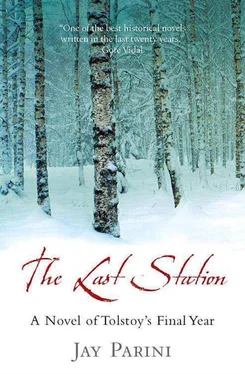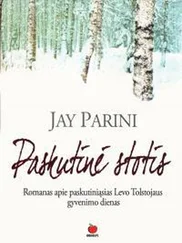We could be grateful for one thing, that young Leo was in Paris. He is a liar and a bully, and Lord knows how he would have tried to thwart my plans.
That evening, before dinner, Sergey arrived. But I felt strongly that he should not be admitted to his father’s bedside – not now.
‘I shall see my father,’ the boy insisted, standing boorishly in the doorway.
‘It’s all right,’ Sasha said. ‘He can go in.’
I saw no point in resisting. Consenting would give me leverage later on, when I might need it.
Leo Nikolayevich was, as I suspected, confused and upset by Sergey’s arrival.
‘How did you find me, Sergey?’ he asked, in a whisper of panic.
‘I was passing through Gorkachev,’ Sergey replied. ‘And I happened upon a conductor who knew where you were. It was sheer luck, Papa!’
Leo Nikolayevich seemed to realize that a game was afoot, and that he had to play his part.
To my surprise, he seemed eager to get news from Sergey about his wife and Yasnaya Polyana. I realized, sadly, that he still yearned for his past life.
After dinner, his fever shot up and he became delirious. Near ten, he fell asleep.
‘What do you think, Dushan?’ I asked in a low voice.
‘It is almost over,’ he said. ‘It would be dishonest to say otherwise.’
Sofya Andreyevna’s dark blue train arrived at midnight and was put on a sidetrack. She rode in a luxurious carriage with several servants, a nurse, and miscellaneous children and their spouses. It was a ludicrous spectacle, worthy of the countess in all respects.
Dushan Makovitsky went to greet her, saying that both he and Dr Nikitin agreed that nobody else could see her husband at present. His unwavering approach paid off: Sofya Andreyevna accepted his argument, agreeing to remain in the train until Leo Nikolayevich was stronger.
‘Sometimes,’ Sergeyenko whispered to me afterward, ‘a warm wind blows from the north.’
No other accommodations were available, so the private train became a makeshift hotel.
Dr Nikitin didn’t arrive until the next day, but Sofya Andreyevna didn’t know this. He examined Leo Nikolayevich and said that his heart was weak and that the left lung was indeed infected. Nonetheless, it was a good sign that the fever had dropped to 100.9 and was holding steady. Pneumonia was by no means the final diagnosis, he said, since he could hear rattling in Leo Nikolayevich’s chest. With pneumonia, the lung – or lungs – fill up with fluid. Instead of rattling, one hears an ominous silence.
Leo Nikolayevich was alert now and delighted by this report; he huddled in a cushioned chair with a blanket around his shoulders and his legs on a stool. He seemed eager to talk.
‘Let me explain to you my view of life, Dr Nikitin, so that you will understand why I left my wife, and why, even if I’m too old for such a thing, I feel I must continue this journey.’
We sat back, astonished, as he delivered a miniature lecture on his philosophy of life: concise and well articulated. I could not have done better.
‘It would be ill-considered of me to recommend anything but prolonged rest,’ Dr Nikitin said. ‘Your resistance is low.’
‘How long, then? A week?’
‘Two weeks – at least. A month would, in fact, be safer.’
‘Impossible! My wife would certainly find me in so much time. That must not happen.’ He turned to me. ‘Vladimir, you understand why this must not happen, don’t you?’
I assured him that I did, but I told him he must not worry. Hadn’t Sergey just explained that Sofya Andreyevna was reconciled to her new life?
‘Do you expect me to believe this?’
‘I do,’ I said. ‘There is no reason to believe otherwise.’
He looked around the room, skeptically, then settled back, tucking his chin into the blanket we had wrapped around him. ‘I’m terribly cold,’ he said. ‘There is a draft somewhere.’
At midday, Goldenweiser arrived from Moscow with Gorbunov, our publisher. I had wired Goldenweiser two days before, but I did not expect to see him in Astapovo. I knew, as did Leo Nikolayevich, that he had an important concert date in Moscow, at the Academy. Some weeks ago we had been discussing the possibility of surprising him with an appearance at the concert. Leo Nikolayevich, though gravely ill, remembered the date of the concert and scolded Goldenweiser for canceling it.
‘I could not have done otherwise,’ Goldenweiser said. ‘How could I play in public with you lying ill in a distant place?’
‘Nonsense,’ Leo Nikolayevich said. ‘When a farmer is plowing his fields, he does not leave those fields, even if his father should be dying. The concert is your field. You should not have left the plow.’
Leo Nikolayevich then turned eagerly to Gorbunov to discuss future publications of The Intermediary . He was going to finish a book called The Way of Life when he settled in the Caucasus or wherever, he explained. He had taken extensive notes already, some of which remained at Yasnaya Polyana, and he hoped we could retrieve them. I assured him that this was no problem. Sasha backed me up, saying she knew which notes he referred to and would help.
Leo Nikolayevich lay back, closing his eyes. He continued speaking, but his voice grew weak.
Suddenly the face of Sofya Andreyevna filled the small glass-paned door of the sickroom. That fat, distorted face, her tomatolike cheeks and nose, pressed against the glass. Her eyes grew wide.
Sasha leaped from her chair, startling her father, who caught a passing glimpse of Sofya Andreyevna before she was pulled away.
‘What!’ he shouted. ‘Who was there?’
‘The stationmaster’s wife,’ Sasha said. ‘She wanted to come in. I told her you were sleeping, that you were not to be disturbed–’
‘It was Sofya Andreyevna!’
‘You’re imagining things,’ she said. ‘It was Ozolin’s wife.’
‘That’s true,’ I said. ‘It was not your wife. She is at home, as Sergey told you.’
‘If Sonya should want to see me, I could not refuse her,’ Leo Nikolayevich said. ‘But it would kill me. I know it would kill me.’
‘There is no possibility of that,’ I said. ‘She is at home.’
Fortunately, he was too sick to argue. He accepted our remarks, though again I wondered if he didn’t know the truth. To prevent further intrusions, we put a blanket over the glass, telling him that the stationmaster’s friends were curious and would disturb him further if we didn’t block the pane.
‘Sasha,’ he said, his voice trembling, barely audible. ‘I must dictate another letter.’
‘Yes, Papa.’ She took up a pad on her knee.
‘Send this to Alymer Maude in England: “Dear Maude – On the way to a place where I hoped to be alone, I was taken ill….”’ He tried to continue, but Sasha couldn’t hear him; his voice dissolved in a loose gargle of phlegm.
‘You can finish later, Papa,’ Sasha said. ‘After you’ve slept.’
I saw in his face the intense frustration of a man for whom human communication had been everything. He could hardly bear it.
Sasha fastened tightly onto her father’s statement that a meeting with his wife would kill him. Rather cruelly, I thought, she rushed to the blue train to convey this sentiment. I followed to make sure Sofya Andreyevna believed it.
‘Have you told him that I nearly drowned myself in the pond?’ her mother asked.
‘He knows everything,’ Sasha said.
‘And what did he say?’
‘He said that if you killed yourself, it would upset him horribly, but that he could not have acted other than he did.’
‘Do you know what this train is costing me?’ Sofya Andreyevna screeched. ‘Five hundred rubles!’
Sasha replied that she didn’t care if that ridiculous train had cost her the entire Tolstoy estate, whereupon Sofya Andreyevna became frenzied, accusing me, then Sasha, then her husband, of every sort of perfidious act. I could hear her screaming from the train, ‘Liar! Liar!’
Читать дальше












